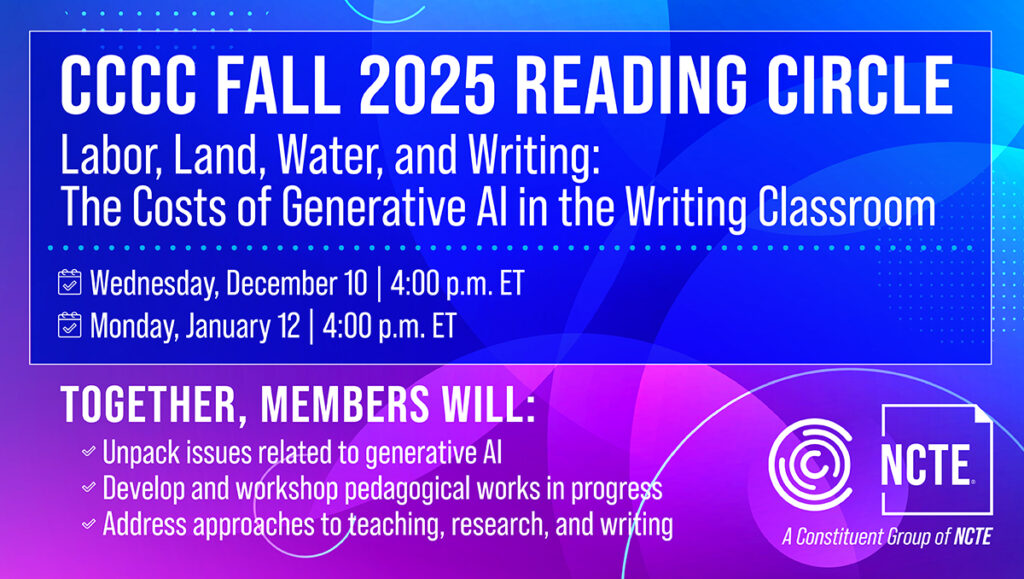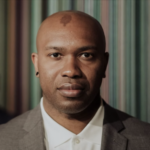Registration for the 2025 CCCC Fall Virtual Institute will close at 9:00 a.m. ET on Monday, November 3.
All registrants will receive an email with connection information on the evening prior to the Institute (November 2) and a reminder email on the morning of the event (November 3).
Institute sessions will NOT be recorded.
Teaching Writing as a Public Good
November 3 | 10:30 a.m.–7:30 p.m. ET
ALL-ATTENDEE OPENING — 10:30–10:45 a.m. ET
Institute Co-Chairs:
- Sherita V. Roundtree, Towson University
- Amy J. Wan, Queens College and CUNY Graduate Center, CUNY
CONCURRENT SESSIONS A – 10:45 a.m.–12:00 p.m. ET
Session A.1 – When Private Companies “Capture” the Means of Public Writing and Education: Evading Platform Capture in the College Writing Classroom
This session begins with an overview of platform capture, including its key features and processes. Next, presenters and attendees work in small groups to generate a list of key campus stakeholders and questions they might ask about capture on their own campuses and/or in their professional organizations. Finally, we will share out, synthesize key points, and identify next steps for further application beyond the session. Ultimately, our hope is that attendees will leave the session with a plan for spotting, pushing back on, and avoiding platform capture in their own teaching and writing.
Speakers: Jennifer Sano-Franchini, West Virginia University
Megan McIntyre, University of Arkansas
Maggie Fernandes, University of Arkansas
Michael Black, University of Massachusetts Lowell
Kofi Adisa, Towson University
Session A.2 – Resisting Cisness in Social Media Curriculum
This generative workshop addresses the urgent need to rethink how we teach social media composing amid escalating anti-trans legislation, platform hostility, and the erosion of education as a public good. While digital writing curricula often normalize corporate-owned, profit-driven platforms, trans and allied communities have long created alternative online spaces grounded in safety, consent, and mutual aid. Participants will collaboratively examine these models, question assumptions about cisnormativity in “public writing,” and develop sample course materials that reframe social media pedagogy around care, community, and justice.
Speakers: Vee Lawson, San Jose State University
Avery Edenfield, Utah State University
Erin Green, University of North Carolina at Greensboro
Ada Hubrig, Sam Houston State University
Ruby Mendoza, Santa Clara University
CCCC FVI LOBBY – 12:00–12:30 p.m. ET
Grab a snack and join your colleagues for networking and open discussion between sessions!
CONCURRENT SESSIONS B – 12:30–1:45 p.m. ET
Session B.1 – Rooted: Writing Environmentalism on Campus
This session introduces Rooted: Sustainability Writing at USC, a new public writing initiative that publishes short-form student writing on sustainability at and around the University of Southern California. Students will revise pieces from sustainability-themed writing courses for our web and print publication, creating space for student voices in debates about what sustainability should look like on campus and beyond. We seek feedback on fostering student voice, navigating institutional and political tensions, and supporting public-facing writing that contributes to inclusive, impactful sustainability conversations. Our session includes a brief writing exercise, breakout discussions on audience, politics, and place, and whole-group reflection.
Speakers: Rochelle Gold, University of Southern California
Corinna Schroeder, University of Southern California
Rebecca Fullan, University of Southern California
Liz Blomstedt, University of Southern California
Session B.2 – MAKING THE GOOD BETTER: Four Perspectives on Improving a Writing Program’s Commitment to the Public Good
Four faculty from Roger Williams University will present a materials showcase to encourage discussion and creativity around opportunities within general education writing programs to make space for student participation in the public sphere. We recognize the ways the pandemic, politics, and AI have radically challenged the context and culture that shape our ongoing attempt to engage students in the public-facing work that many of us take to be a cornerstone in the vocation of teaching.
Speakers: Jennifer Campbell, Roger Williams University
Dahliani Reynolds, Roger Williams University
Genette Merin, Roger Williams University
Diane Beltran, Roger Williams University
CCCC FVI LOBBY – 1:45–2:15 p.m. ET
Grab a snack and join your colleagues for networking and open discussion between sessions!
CONCURRENT SESSIONS C – 2:15–3:30 p.m. ET
Session C.1 – Public Writing in Process
In this session, each speaker will present for 15 minutes and the last 30 minutes of the session will include a generative group discussion.
Speaker 1: Whose Good? Reframing the “Public” in Public Writing
Jason A. Walker, East Texas A&M University
Calls to center public writing in composition classrooms often presume a shared understanding of “public good.” Yet for many international and undocumented students in the US, those presumed definitions do not represent their lived experiences. In the current landscape, public writing can feel less like civic engagement and more like exposure. In response, I argue for an approach to teaching writing that includes redefining “public,” expanding notions of audience beyond US citizens or institutions, and validating rhetorical work done in home languages, diasporic communities, and digital spaces. My paper draws on the work of Nancy Frazer, Royse and Kirsch, and Weisser, and interrogates the assumptions behind public writing pedagogy through the lens of students who are often excluded from both real and imagined audiences. Considering classroom experiences with international, undocumented, and ESOL students, I explore how conventional approaches to public writing can inadvertently marginalize those students in a public sphere that is increasingly tenuous and, potentially, legally constrained. Ultimately, my paper seeks to challenge the presumed understanding of the “public good” in writing instruction while offering pedagogical approaches that allow students who live at the edges of citizenship to write powerfully and safely. It calls for a writing curriculum that not only includes these students but actively reshapes public discourse with them at the center.
Speaker 2: Language, Languaging, and Public Good: Translanguaging AI Literacy for Civic Writing
Jung-Hsien Lin, University of California, Irvine
This session presents a draft Canvas module designed for a lower-division writing course for multilingual students at a minority-serving institution. The module integrates generative AI with foundational academic writing skills—summary, paraphrase, synthesis, and response—while foregrounding translanguaging across Mandarin and English. Students critically examine AI outputs, reflect on multilingual meaning-making, and compose short public-facing texts with process notes on rhetorical and ethical choices. Grounded in literacy studies and the MLA-CCCC Joint Task Force on Writing and AI, the module highlights how multilingual, AI-supported pedagogy can cultivate civic agency, linguistic justice, and equitable approaches to writing as a public good.
Speaker 3: Writing as a Collective (and) Public Good
Laura Clapper, University of Michigan–Ann Arbor
How can we teach writing in such a way as to open new possibilities for collective action? What are the collective ethics involved in writing for/as public good, and how could we engage them more meaningfully? I share a set of tools from socialist and Black feminist activists and feminist political scientists who have been centering collective dimensions of ethics in exciting ways in recent years. I invite experimentation with these feminist tools from outside our discipline, seeing how they might complement or even avail some new affordability from some of our own compositionist feminist tools already at hand.
Session C.2 – Public Writing in Process
In this session, each speaker will present for 15 minutes and the last 30 minutes of the session will include a generative group discussion.
Speaker 1: Thinking about and Re-Thinking Public Writing for Scholars and Student Writers
Sharieka Botex, Duke University
Drawing on Kynard and Baker-Bell’s (2017) articles, Sharieka discusses navigating desires to succeed in academia and using Black women’s scholarly and literacy traditions (Pough; Royster) to address varied audiences. Sharing her conception of Bean and Melzer’s Contemporary Issues Journals, she encourages attendees to avoid what Weisser (pp. 239–240) views as typical assumptions about public writing. Sharieka intertwines Logan and Pough’s guidance for teaching student writers, and Connor’s (7) point that all “. . . our disciplinary ideas have been based in people’s struggle for a better life,” to inspire teachers to realize students mustn’t actually address public audiences to write humanity-considerate and solution-oriented content.
Speaker 2: Building Tech Comm for Community Action: Workshopping a Public Archive of Pedagogical Resources
Traci Gardner, Virginia Tech
This session invites participants to collaboratively workshop a developing site, Tech Comm for Community Action [https://tc4ca.tracigardner.com/], designed to support instructors teaching technical and scientific communication with a focus on justice-oriented community engagement. The site shares assignments and related resources that center storytelling, digital activism, and rhetorical awareness. Participants will reflect on areas in development and consider questions such as these: What’s missing? What would make this resource more useful or more just? What public(s) does this serve—and who might be excluded?
Speaker 3: From Theory to Praxis: Develop a Trans Rhetoric Undergraduate Course
Timothy Oleksiak, University of Massachusetts Boston
I share a syllabus-in-development on a trans rhetoric course. The presentation unfolds around three critical questions:
-
- Who am I to teach such a course (Patterson, 2018; Love, 2019)?
- How can teachers of trans rhetoric think about this area of study free from, but not ignorant of violence surrounding trans lives (Gills-Peterson, 2024; Hubrig et al., 2024; LeMaster, 2025)?
- What assignments emerge from a commitment to trans object-making and archival work?
The presentation will situate the course in the political contexts of my communities and university, share a broad vision of the course, and include drafted assignment sheets.
CCCC FVI LOBBY – 3:30–4:00 p.m. ET
Grab a snack and join your colleagues for networking and open discussion between sessions!
CONCURRENT SESSIONS D – 4:00–5:15 p.m. ET
Session D.1 – Individual Material Showcases
In this session, each speaker will present for 15 minutes and the last 30 minutes of the session will include a generative group discussion.
Speaker 1: Grounded in Place: Teaching Research through Local Engagement
Wren Bouwman, Iowa State University
Students often approach research by tackling large, global topics drawn from major news outlets, but this tendency can leave them disconnected from the immediate contexts where change is most tangible. Rooted in the belief that writing instruction should equip students not only with academic research skills but also with civic agency, this materials showcase presents a scaffolded sequence of assignments that culminates in a community-centered research project for intermediate composition courses. This approach tethers global issues to local communities, guiding students from sourcing local news to attending community meetings or interviewing residents, and culminating in a final project that connects broad concerns to nearby realities. Drawing on Flora’s Community Capital Framework, the assignments help students examine how various forms of capital are invested in their communities while identifying opportunities for meaningful contribution. The session will share assignment descriptions, example lesson plans, and strategies for adapting them across diverse teaching contexts. Ultimately, the showcase demonstrates how composition courses can be reimagined as spaces where students develop not only rhetorical skills but also the critical awareness and civic dispositions essential for writing with and for the public good.
Speaker 2: Writing Care into Contested Spaces: Public Writing in a Professional Writing and Art Course
Candace Epps-Robertson, Independent scholar and formerly tenured professor
This presentation explores how professional writing pedagogy can engage contested institutional spaces, using museums as a case study. Over two semesters, I taught an undergraduate course, Professional Writing and Art, at UNC-Chapel Hill, in which students produced zines, guides, and critical texts for an art installation I curated at the campus museum. Framed around themes of care, play, and community, the course asked how writing might foster more equitable, responsive museum practices. I will share course materials, highlight challenges in balancing creativity with institutional constraints, and offer strategies for designing public writing projects attentive to care and justice.
Speaker 3: Student Activism as Public Leadership in the Era of Accountability
Charles McMartin, Florida State University
Teaching writing as a public good requires thinking systematically about the rise of the accountability era in education. Marked by the 2006 Spellings Commission Report and the 2010 Common Core Curriculum, accountability discourse shifted higher education’s value from civic ideals to market-based logics. To claim the teaching of writing as a public good, we can turn to the leadership of student activists who model democratic engagement. Accordingly, this material showcase introduces a heuristic for designing writing assignments that center student activists’ efforts to influence public opinion on their campus and in their local communities.
Session D.2 – Individual Material Showcases
In this session, each speaker will present for 15 minutes and the last 30 minutes of the session will include a generative group discussion.
Speaker 1: The Great Speckled Bird and Public Multimodal Writing
Christian Gallichio, Emory University
This material showcase will walk attendees through the process of creating and implementing a course that utilized public multimodal writing as a means to explore and catalog underground and alternative newspapers from the 1960s and ’70s. Students created a website that hosted their work and wrote all of their assignments with the knowledge that their work would be built upon by subsequent classes, creating a continuum of writing and editing instead of a closed loop that instructor-facing assignments often create. This presentation will not only showcase my own course, but will also involve attendees in considering how to best navigate public-facing writing that challenges both students and institutions.
Speaker 2: Reading and Writing Environmental Equity for the Public Good
Barbara George, Carnegie Mellon University
This material showcase explores the critical reading and writing in a course that explores the complex challenges in communicating “the environmental public good” as related to equity with freshmen with global backgrounds. The course is centered on critically analyzing research, policy, and lay communication in the form of research agendas and advocacy within government agencies, educational programs, and nonprofits. The materials cover scaffolded assignments and framing the final research paper. This includes an analysis of sustainability goals, definitions of environmental justice, and the reality of shifting political and policy landscapes. The institute audience will interact with links for the course.
Speaker 3: Writing for the Public Good: Civic Engagement in the First-Year Composition Classroom
Elizabeth Labanna Harney, North Dakota State University
In this study, I examine how a first-year writing course can function as a civic space where students engage with pressing social issues and develop as ethical citizens. Too often, writing classrooms avoid such concerns, leaving students disconnected from the world. To address this gap, I designed assignments including the Op-Ed for Change, How-To Community Guide, Digital Advocacy StoryMap, Civic Dialogue Podcast Episode, and Participatory Photography Project. Using qualitative analysis of student writing, reflections, and observations, I explore how learners respond and develop identities as socially responsible writers.
CCCC FVI LOBBY – 5:15–5:45 p.m. ET
Grab a snack and join your colleagues for networking and open discussion between sessions!
CONCURRENT SESSIONS E – 5:45–7:00 p.m. ET
Session E.1 – Public Writing Pedagogy in a Time of Crisis: Generating Solidarity and Resistance
This generative group explores the evolving challenges and ethical complexities of teaching public writing in a time of heightened political scrutiny and institutional precarity. Against a backdrop of recent attacks on academic freedom, self-directed and institutionally mandated censorship, and increasing surveillance and risk, this group interrogates what it means to teach and to write “publicly” when the very notion of “the public” is contested and unevenly accessible. Through collaborative discussion and resource sharing, the group aims to foster solidarity and resistance across diverse contexts, while reimagining public writing as a space for advocacy, relationality, and transformative pedagogy.
Speakers: Kristen Wheaton, Utah State University
Megan Heise, Utah Tech University
Mary Ellen Greenwood, Utah State University
Rachel Quistberg, Utah State University
Session E.2 – Crowdsourcing Feminist Futures: Public Writing for Coalition and Change
This session explores how digital, crowd-sourced public writing can connect lived experiences of national issues to collective action. Drawing on feminist theories and methods, along with library perspectives on information ethics and access, presenters will discuss how to ethically create and circulate stories in online spaces while navigating the affordances and constraints of digital platforms. We will showcase our collaborative project, Feminist Dispatches From . . ., which pairs snapshots of daily life with “microactivist” prompts. Participants will contribute stories, imagine new digital spaces, and leave with strategies for sustaining accessible, activist-driven public writing projects.
Speakers: Nerissa Nelson, University of Wisconsin-Stevens Point
Kelli Gill, Montana State University
Holly Hassel, Michigan Technological University
Vee Lawson, San Jose State University
All-Attendee Closing – 7:00–7:30 p.m. ET
Institute Co-Chairs:
- Sherita V. Roundtree, Towson University
- Amy J. Wan, Queens College and CUNY Graduate Center, CUNY




 Dustin Edwards is an associate professor of rhetoric and writing studies and director of the Writing Center at San Diego State University. His research areas include digital and material rhetorics, environmental and land-based rhetorics, technical and professional communication, and rhetorics of science and technology. He is author of Enduring Digital Damage: Rhetorical Reckonings for Planetary Survival (2025).
Dustin Edwards is an associate professor of rhetoric and writing studies and director of the Writing Center at San Diego State University. His research areas include digital and material rhetorics, environmental and land-based rhetorics, technical and professional communication, and rhetorics of science and technology. He is author of Enduring Digital Damage: Rhetorical Reckonings for Planetary Survival (2025). Hannah Hopkins is an assistant professor of rhetoric and composition at Georgia State University in Atlanta, Georgia. Her research engages the tools, practices, and methods that help us make sense of and with large-scale networked infrastructures. Her current book project examines how expanded perceptual fields inform un/shared understandings of environmental impact.
Hannah Hopkins is an assistant professor of rhetoric and composition at Georgia State University in Atlanta, Georgia. Her research engages the tools, practices, and methods that help us make sense of and with large-scale networked infrastructures. Her current book project examines how expanded perceptual fields inform un/shared understandings of environmental impact. Donnie Johnson Sackey is an associate professor and associate chair of rhetoric and writing at the University of Texas at Austin, and a fellow in Columbia University’s Center for Global Energy Policy. His book Trespassing Natures: Species Migration and the Right to Space was published in 2024.
Donnie Johnson Sackey is an associate professor and associate chair of rhetoric and writing at the University of Texas at Austin, and a fellow in Columbia University’s Center for Global Energy Policy. His book Trespassing Natures: Species Migration and the Right to Space was published in 2024. Maggie Fernandes (she/her) is an assistant professor of rhetoric and composition at the University of Arkansas. Her scholarly expertise is in digital/cultural rhetorics, institutional oppression, and user experience design. Her work has been published in Computers and Composition, Composition Studies, Enculturation, and Kairos. She is one of the cofounders of the Refusing Generative AI in Writing Studies website.
Maggie Fernandes (she/her) is an assistant professor of rhetoric and composition at the University of Arkansas. Her scholarly expertise is in digital/cultural rhetorics, institutional oppression, and user experience design. Her work has been published in Computers and Composition, Composition Studies, Enculturation, and Kairos. She is one of the cofounders of the Refusing Generative AI in Writing Studies website. Dr. Vyshali Manivannan is an Eelam Tamil American chronically ill scholar whose work emphasizes the culturally specific nature of chronic pain through diasporic-disabled composition, a practice with which GenAI is incompatible. She is an assistant professor in the Department of English, Writing, and Cultural Studies at Pace University–Pleasantville.
Dr. Vyshali Manivannan is an Eelam Tamil American chronically ill scholar whose work emphasizes the culturally specific nature of chronic pain through diasporic-disabled composition, a practice with which GenAI is incompatible. She is an assistant professor in the Department of English, Writing, and Cultural Studies at Pace University–Pleasantville. Travis Margoni is an English faculty member at Yakima Valley College, where he has served as department chair and leads WAC initiatives. He has been a member of the CCCC and TYCA Executive Boards. Margoni’s scholarship has been published by TETYC, Kendall Hunt, and the WAC Clearinghouse.
Travis Margoni is an English faculty member at Yakima Valley College, where he has served as department chair and leads WAC initiatives. He has been a member of the CCCC and TYCA Executive Boards. Margoni’s scholarship has been published by TETYC, Kendall Hunt, and the WAC Clearinghouse.